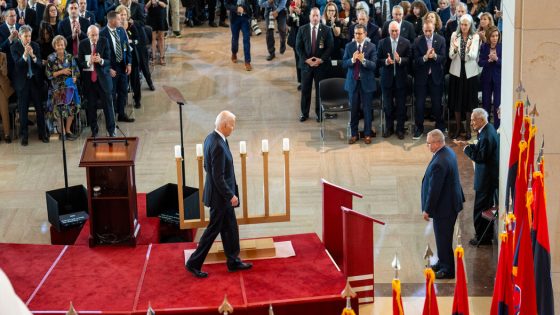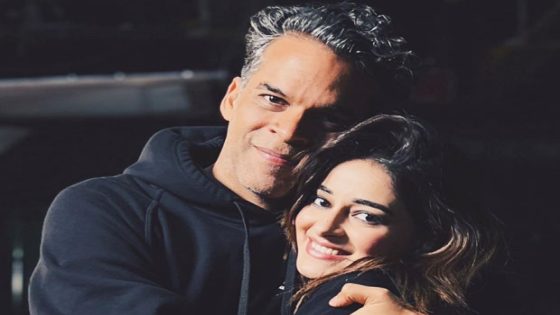These were the images Americans were presented on Tuesday about their two choices for president: One taking his grandchildren to Dachau to bear witness to the horrors of Nazi death camps, the other sitting on a hotel bed in his boxer shorts waiting for sex with a porn star.
It was perhaps a twisted cosmic coincidence that President Biden’s nationally televised speech on Holocaust remembrance would take place at the exact moment that former President Donald J. Trump was in a courtroom confronted by Stormy Daniels’s testimony about a sexual tryst gone wrong.
But the surreal synchronism of the disparate events 182 days before the election captured the sometimes unreal reality of a presidential race like none before it, at once profound and tawdry, a contest with momentous consequences and a circuslike surround sound. A nation grappling with two wars overseas and campus unrest at home is also being asked to parse through the unseemly details of a married man’s purported dalliance with a woman who had sex on camera professionally.
This may not have been what the founders had in mind when they established the presidency, watching Mr. Biden’s speech at the Capitol condemning “a ferocious surge of antisemitism” while internet feeds provided the latest from Ms. Daniels’s account about the particular coital position she and Mr. Trump assumed. Yet so goes 2024, a year of twists and turns that defy history and the imagination.
Mr. Biden had the more conventional though not inconsiderable challenge, exhibiting presidential leadership at a time of national trauma. He has come under fire from the left in his own party for not doing more to restrain Israel’s war in Gaza, but wanted to use the annual remembrance ceremony to link the murder of six million Jews during World War II to the killing of 1,200 people during the Oct. 7 Hamas-led terrorist attack on Israel.
It was a speech with high-minded historical flourishes and deeply personal recollections, one aimed at summoning “our common humanity” while “heeding the lessons of one of the darkest chapters in human history.” He described his father teaching him about the Shoah, or Holocaust, at the dinner table when he was young and passing the lessons along to his children and their children when he was older.
“I want you to know,” Mr. Biden said in the Capitol’s Emancipation Hall, speaking directly to the Jewish community, “I see your fear, your hurt, your pain. Let me reassure you, as your president, you’re not alone. You belong. You always have and you always will.”
Mr. Trump’s challenge was vastly different, as he was forced to listen silently and sullenly as Ms. Daniels after all these years finally testified against him in a proceeding that could result in his imprisonment. While he has long denied the sexual encounter that he paid $130,000 to keep quiet, Ms. Daniels under oath provided one raw recollection after another.
He listened unhappily as she described arriving for a dinner in July 2006 to find him in satin pajamas and talking about her work for a “condom-mandatory company” and her negative tests for sexually transmitted disease. He was 60 at the time and she was 27, just three years older than his daughter Ivanka. Indeed, she testified, he told her, “You remind me of my daughter. She is smart and blond and beautiful and people underestimate her as well.” He called her “honeybunch.”
Ms. Daniels delved into considerable specifics — Mr. Trump’s lawyers and even the judge thought too many specifics — about the encounter itself, how she went into a bathroom and emerged to find him “minus a lot of clothing” on the bed. “I felt the blood leave my hands and my feet almost like if you stand up too fast,” she said. “I thought, ‘Oh, my God, what did I misread to get here?’” Nonetheless, she took her clothes off and “next thing I know I was on the bed.”
While other presidents have gotten embroiled in public sex scandals, none have ever faced an accuser in court like this. The closest predicate would be the exceedingly graphic testimony elicited by the independent counsel Ken Starr’s prosecutors from Monica S. Lewinsky in 1998 about her affair with President Bill Clinton. But that was conducted behind closed doors in front of a grand jury and later communicated to the public through transcripts.
The House that went on to impeach Mr. Clinton on charges of perjury and obstruction of justice to cover up the affair never actually called Ms. Lewinsky to testify. When the Senate conducted its trial, leaders of both parties were so nervous about a public discussion of sex that they arranged for her to be deposed in private. Lawyers for the two sides were then allowed to publicly show only carefully edited snippets of a less-salacious nature from her interview.
There was no such editing on Tuesday in a Manhattan courtroom.
The contrast between the two presidents on display on this particular day was as stark as could be conceived but may not necessarily surprise many Americans.
Voters at this point have known about Ms. Daniels’s account for years, along with the stories of many other women who have accused Mr. Trump of sexual misconduct, and many have long factored these allegations into their judgments of him, for good or ill. Indeed, he was found liable by a jury in a civil case last year of sexually abusing E. Jean Carroll without any meaningful impact on his poll numbers.
Since Ms. Daniels’s testimony was not broadcast, Americans were left to absorb her narrative through reporters conveying it on television, radio, online or in print, which may have less power to shock the public. Mr. Trump did what he could through his lawyers and social media account to turn attention away from his alleged infidelity to what he claims is the unfairness of the legal action against him.
Mr. Biden, for his part, made no mention of the events in New York, as he spoke somberly and evoked the ghosts of Elie Wiesel, Raoul Wallenberg and Tom Lantos. The anger he faces over his support for Israel’s war is real and a political threat to him in a closely matched race where small shifts in critical states could make all the difference.
He, of course, knew that. And he, of course, knew what his opponent was doing on this day. The president said what he had to say and headed back to the White House. And a campaign focused on atrocities and absurdities wrapped up another day with 181 still to go.
Source Agencies



